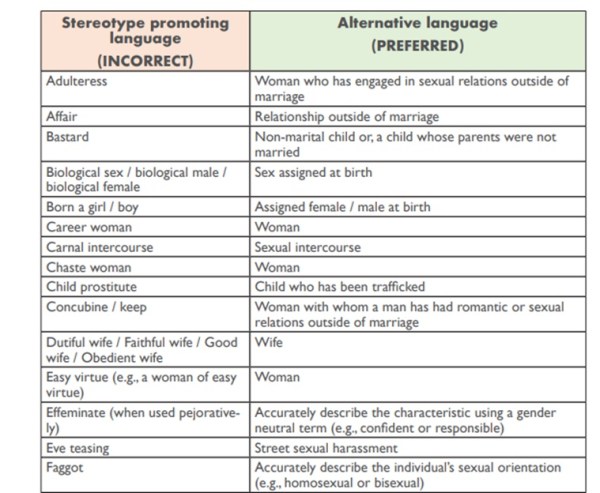“Eve teasing” is the incorrect way of saying “street sexual harassment” which should be the “alternative language… preferred” in courts, and it is a “stereotype” that “women who consume alcohol or smoke cigarettes want to engage in sexual relations with men”.
These are among the dozens of “stereotypes” and “incorrect… stereotype promoting language” flagged by the Supreme Court in its ‘Handbook on Combating Gender Stereotypes’ launched Wednesday.

The handbook, according to the top court, “aims to assist judges and the legal community in identifying, understanding and combating stereotypes about women”.
Story continues below this ad
It contains a “glossary of gender-unjust terms and suggests alternative words or phrases which may be used while drafting pleadings as well as orders and judgments”.
Some of the other terms that it wants courts to avoid using are adulteress, bastard, career woman, carnal intercourse, concubine/keep, housewife, mistress, prostitute, transsexual and unwed mother.
On whether to use survivor or victim for someone who has been raped, it says “an individual who has been affected by sexual violence may identify themselves as either a “survivor” or “victim”. Both terms are applicable unless the individual has expressed a preference, in which case “the individual’s preference should be respected”.
The handbook calls upon the “Indian judiciary” to “recognise the deep-rooted impact of gender stereotypes and actively work to dismantle them from its thinking, decision-making, and writing”.
Story continues below this ad
In his foreword to the book, Chief Justice of India D Y Chandrachud writes that “relying on predetermined stereotypes in judicial decision-making contravenes the duty of judges to decide each case on its merits, independently and impartially” and that “in particular, reliance on stereotypes about women is liable to distort the law’s application to women in harmful ways”.
 Some of the terms the SC handbook flags, and the alternatives it suggests. (Screenshot)
Some of the terms the SC handbook flags, and the alternatives it suggests. (Screenshot)
The CJI points out that “even when the use of stereotypes does not alter the outcome of a case, stereotypical language may reinforce ideas contrary to our constitutional ethos”.
Stating that “challenging and overcoming stereotypes is essential to ensuring an equal, inclusive, and compassionate society”, the CJI underlines it is “vital that judges not only avoid relying on stereotypes in their decision-making and writing, but also actively challenge and dispel harmful stereotypes”.
He says “if harmful stereotypes are relied on by judges, it can lead to a distortion of the objective and impartial application of the law” and “perpetuate discrimination and exclusion”.
Story continues below this ad
The handbook points out that “reliance on stereotypes is often subconscious” and “can prevent us from understanding the reality of a situation and can cloud our judgment”.
It says that “on a micro-level, stereotypes lead to exclusion and discrimination in workplaces, educational institutions, and public places” and “may also have an adverse impact on the mental health or professional performance of the members of the stereotyped group because they are aware that they are being viewed in a particular manner”.
Stating that “the harm caused can be enormous” if a judge “relies on preconceived assumptions about people or groups when deciding cases or writing judgements”, it says this can lead the “judges to ignore or bypass the requirements of law or distort the application of the law vis-à-vis specific persons or groups”.
“Using stereotypes, instead of objectively evaluating the situation, goes against the constitutional principle of ‘equal protection of laws’, which posits that the law should apply uniformly and impartially to every individual, irrespective of their membership to a group or category. The use of stereotypes by judges also has the effect of entrenching and perpetuating stereotypes, creating a vicious cycle of injustice.”
Story continues below this ad
The handbook lists the most common kinds of gender stereotypes that concern women as stereotypes “based on the so-called ‘inherent characteristics’ of women… based on the gender roles of women; and… related to sex, sexuality, and sexual violence”.
While it’s a stereotype based on the so-called “inherent characteristics” that “all women want to have children”, the “reality” is “all women do not want to have children” and “deciding to become a parent is an individual choice that every person takes based on a variety of circumstances”, the handbook points out.
That “wives should take care of their husband’s parents” is a stereotype based on gender roles, it says, adding that “the responsibility of taking care of elderly individuals in the family falls equally on individuals of all genders” and “not the sole remit of women”.
Illustrating stereotypes concerning sex and sexual violence, the handbook says the belief is “women who are sexually assaulted or raped by men cry incessantly and are depressed or suicidal. If a woman’s behaviour does not conform to this mould, she is lying about having been raped”. The “reality is different people react differently to traumatic events…There is no ‘correct’ or ‘appropriate’ way in which a survivor or victim behaves”.
Story continues below this ad
In this context, it also says there is a “stereotype” that “dominant caste men do not want to engage in sexual relations with women from oppressed castes” and “therefore, any allegation of sexual assault or rape by an oppressed caste woman against a dominant caste man is false”.
The “reality”, however, is that “rape and sexual violence have long been used as a tool of social control. Dominant caste men have historically used sexual violence as a tool to reinforce and maintain caste hierarchies”, says the handbook which also goes on to discuss some of the important cases in which the Supreme Court rejected several of the gender stereotypes.
It says it is a “patriarchal and harmful… stereotype” that “good… women prefer death rather than being raped by a man” and cautions that “such beliefs may cause survivors/victims to consider suicide because they have been raped by a man”.



 Some of the terms the SC handbook flags, and the alternatives it suggests. (Screenshot)
Some of the terms the SC handbook flags, and the alternatives it suggests. (Screenshot)





